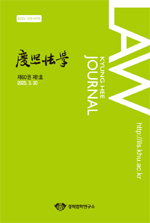- 영문명
- The Legal Grounds and Legitimacy of Mandated Apology Letters as Educational Disciplinary Measures : An Analysis of Supreme Court Decision 2022Du39185 (December 1, 2022)
- 발행기관
- 경희법학연구소
- 저자명
- 정의석(Eui Seok Chung)
- 간행물 정보
- 『경희법학』제60권 제1호, 35~63쪽, 전체 29쪽
- 주제분류
- 법학 > 민법
- 파일형태
- 발행일자
- 2025.03.31
6,280원
구매일시로부터 72시간 이내에 다운로드 가능합니다.
이 학술논문 정보는 (주)교보문고와 각 발행기관 사이에 저작물 이용 계약이 체결된 것으로, 교보문고를 통해 제공되고 있습니다.

국문 초록
이 논문에서는 대법원 2022. 12. 1. 선고 2022두39185 판결을 중심으로 교육적 징계로서의 사과편지 작성의 법적 근거와 정당성을 검토한다. 대상판결은 학칙상 ‘기타 이에 준하는 업무’와 ‘심성교육’, 학교폭력예방법상 ‘서면사과’ 규정 등에 대한 해석론을 토대로, 사과편지 작성의 법적 근거가 결여되어 있다고 판단하였다.
이러한 판단의 타당성을 검토하기 위해서는 먼저 초·중등학교 학칙의 법적 성격을 이해할 필요가 있다. 초·중등학교 학칙은 헌법상 보장된 교육의 자주성과 전문성을 바탕으로 하는 자치규범으로서의 성격을 가진다. 초·중등교육법령이 징계의 기본원칙만을 제시하고 세부적인 규범 형성은 교육현장의 전문적 판단에 맡긴 것은, 교육활동이 각 학교와 학생의 구체적 상황에 따라 달라질 수밖에 없다는 본질적 특성을 반영한 것이다.
이러한 점을 고려하면, 대상판결이 사과편지 작성을 ‘학교 내의 봉사’에 포함될 수 없다고 본 것은 교육적 징계의 특수성을 충분히 고려하지 못한 것으로 보인다. 초·중등교육법령이 ‘교육을 위하여 필요한 경우’라고 하여 학생을 징계할 수 있도록 하는 포괄적 규정을 두어 교육의 자주성을 보장하고 있는 점, 그리고 사과편지 작성이 가진 교육적 가치가 적지 않은 점 등을 고려할 때, ‘학교 내의 봉사’의 한 형태로 인정될 수 있는 것으로 판단된다. 특히 학칙의 ‘심성교육’ 문구는 교육공동체의 실천적 합의를 통해 도출된 것으로서, 구체적 교육활동의 근거가 된다고 해석함이 타당하다.
나아가 재량권 일탈·남용의 관점에서도, 본 사안의 사과편지 작성은 사회통념상 현저하게 타당성을 잃었다고 보기 어렵다. 수업 중 휴대전화 무단사용과 교사에 대한 부적절한 언행이라는 비위행위의 내용, 교육질서 확립과 신뢰관계 회복이라는 교육적 목적의 정당성, 그리고 해당 조치의 교육적 의미 등을 종합적으로 고려할 때, 이는 단순한 제재를 넘어 학생의 반성과 성찰을 통한 인격적 성장을 도모하는 적절한 교육적 조치라고 판단된다. 결론적으로 대상판결은 사과편지 작성의 법적 근거에 대한 문언적 해석에 치중한 나머지, 교육 현장의 전문적 판단과 자율성이라는 헌법적 요청을 충분히 반영하지 못한 것으로 판단된다.
영문 초록
In this paper, I examine the legal grounds and legitimacy of mandated apology letter writing as an educational disciplinary measure, focusing on the Supreme Court Decision 2022Du39185 (December 1, 2022). The decision under review determined that apology letter writing lacks proper legal basis, based on interpretations of school regulation phrases such as ‘other equivalent duties’ and ‘character education,’ as well as the ‘written apology’ provision in the School Violence Prevention Act.
To evaluate the validity of this judgment, it is necessary to first understand the legal nature of elementary and secondary school regulations. These regulations function as autonomous norms based on the constitutionally guaranteed independence and professionalism of education. The Elementary and Secondary Education Act provides only basic disciplinary principles, leaving specific norm formation to professional judgment in educational settings, reflecting the essential characteristic that educational activities must vary according to each school's and student's specific circumstances.
Considering these aspects, the Court's ruling that apology letter writing cannot be included in ‘in-school service’ appears to insufficiently consider the unique nature of educational discipline. The Act includes a comprehensive provision allowing student discipline ‘when necessary for education,’ thereby ensuring educational autonomy. Given the educational value of apology letter writing, it could reasonably be recognized as a form of ‘in-school service.’ In particular, the term ‘character education’ in school regulations, derived through educational community consensus, should be interpreted as providing grounds for specific educational activities.
Furthermore, from the perspective of discretionary abuse, the apology letter writing in this case was an appropriate educational measure. Considering the nature of the misconduct (unauthorized mobile phone use during class and inappropriate behavior toward teachers), the legitimacy of educational purposes (establishing educational order and restoring trust), and the educational significance of the measure, this goes beyond mere punishment to promote personal growth through reflection. In conclusion, the Court's decision, by focusing on literal interpretation of the legal basis for apology letter writing, failed to adequately reflect the constitutional requirements of professional judgment and autonomy in educational settings.
목차
Ⅰ. 사실관계 및 소송의 경과
Ⅱ. 쟁점의 정리
Ⅲ. 초·중등학교 학칙의 법적 성격
Ⅳ. 사과편지 작성의 법적 근거
Ⅴ. 사과편지 작성의 재량권 일탈·남용 여부
Ⅵ. 결 론
키워드
해당간행물 수록 논문
- 경희법학 제60권 제1호 목차
- 카메라등이용촬영죄의 개정방안 - 대법원의 해석에 따른 규율의 공백을 중심으로
- 면책특권과 국회증언감정법 제9조 제3항의 불이익처분금지 관계
- 부작위범과 인과관계 판단: 응급환자에 대한 구호조치 미이행과 사망의 경우
- 형사재판에서 증인신문의 실효성 제고를 위한 증언녹취제도 연구 - 미국 증언녹취제도의 시사점을 중심으로
- 공직선거법 제250조 제1항의 ‘행위’와 관련한 해석론과 입법론
- 재도의 파산신청 재론 - 대법원 2023. 6. 30.자 2023마5321 결정
- 교육적 징계로서의 사과편지 작성의 법적 근거와 정당성 - 대법원 2022. 12. 1. 선고 2022두39185 판결
- 프랑스 민법상 과책(faute)에 관한 연구
- 소년법과 가정폭력처벌법의 동행 제도에 관한 고찰
- 이혼으로 인한 재산분할청구권의 일신전속성과 소송수계 - 대법원 2023. 9. 21.선고 2023므10861, 10878 판결과 관련하여
- 고준위방사성폐기물관리에 관한 법적 쟁점에 대한 고찰
- 통상임금의 개념과 판단기준 - 대상판결 : 대법원 2024. 12. 19. 선고 2020다247190 전원합의체 판결 및 대법원 2024. 12. 19. 선고 2023다302838 전원합의체 판결
참고문헌
관련논문
법학 > 민법분야 BEST
- 생성형 AI와 저작권 문제 - 저작권 침해와 저작물성의 사례와 분석
- AI 학습데이터 무단 사용에 대한 저작권 보호 방안
- 생성형 인공지능 시대, 저작권의 패러다임은 바뀌어야 하나? - 저작권-인공지능 논의에 관한 비판적 검토
법학 > 민법분야 NEW
- 청렴사회를 위한 이재명정부의 역할: 반부패·청렴의 미래 어떻게 설계할 것인가?
- AX 전환 정보보호 가이드 프레임워크에 관한 연구: 대학교육기관 적용 공정성 확립을 중심으로
- Revisiting the relationship between Corruption and Economic Growth : Cases and Theoretical Framework
최근 이용한 논문
교보eBook 첫 방문을 환영 합니다!

신규가입 혜택 지급이 완료 되었습니다.
바로 사용 가능한 교보e캐시 1,000원 (유효기간 7일)
지금 바로 교보eBook의 다양한 콘텐츠를 이용해 보세요!



